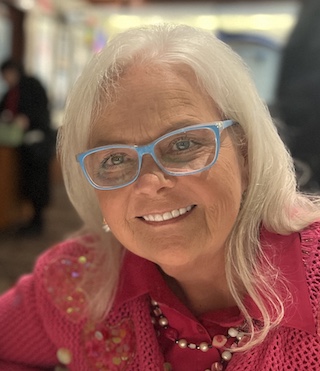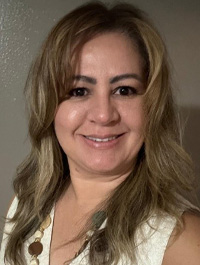-
Daddy’s Little Girl
 Written by Therese Martin, volunteer with Iron Rose Sister Ministries in Washington
Written by Therese Martin, volunteer with Iron Rose Sister Ministries in WashingtonMy great-granddaughter Ava had been spending the day with “the Nanapapa”. That’s her name for us; not “Nana and Papa”, oh no! We are The Nanapapa, a sort of combined source of hugs and treats and vanilla ice cream. The day was over, and her daddy came to pick her up after work.
“Daddy!” she squealed, running full speed into his legs and wrapping her arms around his knees. He didn’t fall over; he just reached down and picked her up in a loving embrace. She started telling him about her day, and asking if they could stop at her favorite fast-food place on the way home. She was a happy little girl!
I started to wonder; as daughters of God, are we as excited about our Father in heaven as Ava was about her daddy? Spiritually speaking, how often do we do that? How often do we run excitedly towards God, our loving Father, our Abba…our Daddy? How often do we fling our arms around His knees and let Him know we’re so glad to be with him? To be able to bring Him our problems and just say how much we love Him?
As we age, our lives change. We aren’t little girls any more. We are young women, then new brides, then mothers, then busy women juggling full time work, school age children, and maybe caring for our parents. We’re so busy! Then we are older, with all the physical pain that sometimes brings, and often emotional pain as well. We can’t even imagine running!
When we think of ourselves as daughters of God, we forget that he is God of time and space as well as heaven and earth. When we talk to Him, it’s with all the burdens of our present, serious, grown-up selves. It’s the 40, or 50, or even 70-year-old self that comes to talk to her Father, not the four-year-old!
But to God, we are still the four-year-old! Fifty or sixty years was just a second ago. He doesn’t see the wrinkles or sagging skin. That’s just the outfit we are wearing at the moment. He sees the shiny new soul He just made a second ago. To Him, we are His precious little girl. He’s a very proud, excited father who loves to talk with us at every opportunity.
Let’s look at the Easy Reader’s Version of the New Testament for a simplified rendering of that important lesson from Jesus:
““And when you pray, don’t be like the people who don’t know God. They say the same things again and again. They think that if they say it enough, their god will hear them. Don’t be like them. Your Father knows what you need before you ask him. So this is how you should pray: ‘Our Father in heaven, we pray that your name will always be kept holy. We pray that your kingdom will come— that what you want will be done here on earth, the same as in heaven. Give us the food we need for today. Forgive our sins, just as we have forgiven those who did wrong to us. Don’t let us be tempted, but save us from the Evil One.’” (Matthew 6:6-13 ERV)We have turned that simple process into a rote, memorized formula. What if we look at those principles of prayer from the perspective of a little girl who really loves her Daddy? What might it sound like? It wouldn’t be formal or serious, that’s for sure.
“Daddy, Daddy, Daddy! There you are! I missed you so much! I love you because you’re so awesome! I wish you were with me all the time so everyone could see you! I wish everyone loved you the way I do! I wish it so much!
Hey, can we get some fries on the way home? I’m really hungry. I want fries every day! Can we have fries every day? Pleeease? Oh, sorry, Daddy, did I step on your foot? I am so sorry I hurted you and gave you an owie, but I love how you always forgive me. I should do that for other people too, huh? Even when I gots an owie? Okay, Daddy, I’ll try. Oh, look, I almost stepped in that hole! Thank you, Daddy, for lifting me up so I didn’t fall. You always take good care of me. You are so wonderful and I love you so much! You’re the bestest daddy forever and ever!”
As we get caught up in the hassles of daily life, the demands on our time, family responsibilities, all the blocks and burdens of normal existence, do we forget who we really, really are? Don’t ever forget you’re Daddy’s little girl, who loves Him so very much and can’t wait till it’s time to go home for reals.
#IronRoseSister #HIStories #childofGod #OurHeavenlyFather #Daddysgirl #guestwriter #blog
-
David: His Prayers in Psalms and Communication with God
Written by Deanna Brooks, volunteer with Iron Rose Sister Ministries in Arkansas

When we think of David, we often think of the shepherd boy… the youngest in the family… who killed Goliath, spent years running from Saul’s anger, became king, took another man’s wife, and had him killed in battle.
There is more to David than those events. There is his heart—a heart devoted to God in constant communication.
Samuel told King Saul in 1 Samuel 13:14 (ESV), “The Lord has sought out a man after his own heart.” This was said when David was still a shepherd, before he slew Goliath. God saw David’s heart.
In 1 Chronicles 17:16, we see David’s HUMILITY. Nathan told David he couldn’t build the temple, but the Lordwas building a house for him: a dynasty of kings. “Who am I, O LORD God, and what is my house, that you have brought me this far?“
In Psalm 73, we find a description of David’s relationship with the Father and why Samuel described him as a man after God’s own heart. Additional passages show David’s constant communication with God in various situations:
LOVE and TRUST:
Psalm 18:1, “I love you, O LORD, my strength.”
Psalm 37:3, “Trust in the Lord and do good.”
RECOGNITION for WHO GOD IS:
Psalm 9:1, “I will give thanks to the Lord with my whole heart; I will recount all of your wonderful deeds.”
Psalm 19:1, “The heavens declare the glory of God, and the sky above proclaims his handiwork.”The rest of this Psalm continues to proclaim the majesty of God.
Psalm 40 is a prayer of THANKSGIVING for deliverance:
“I have not hidden your deliverance within my heart, I have spoken of your faithfulness and your salvation” (vs. 10).
OVERWHELMED by betrayal:
In Psalm 55, David pours out his heart because of the rebellion of his son Absolom. Ahithophel, one of his thirty mighty men and a trusted advisor, sided with Absolom.
He redeems my soul in safety from the battle that I wage, for many are arrayed against me. God will give ear and humble them… My companion stretched out his hand against his friends; he violated his covenant. His speech was smooth as butter, yet war was in his heart; his words were softer than oil, yet they were drawn swords… But I will trust in you. (55:18-23)
PROTECTION when fleeing from Absalom:
Psalm 3:3, “But you, O LORD, are a shield about me, my glory, and the lifter of my head.”
REFUGE:
God is our refuge and strength, a very present help in trouble. Therefore we will not fear though the earth gives way, though the mountains be moved into the heart of the sea…The Lord of hosts is with us; the God of Jacob is our fortress. (Ps. 46:1-2,7)
THANKSGIVING for God’s MERCY:
Psalm 103:8, “The Lord is merciful and gracious, slow to anger and abounding in steadfast love.”
WORSHIP and PRAISE:
Psalm 106:1-2, “Praise the Lord! Oh, give thanks to the Lord, for he is good, for his steadfast love endures forever! Who can utter the mighty deeds of the Lord, or declare all his praise?”
Heartfelt words of REPENTANCE after his sin with Bathsheba and murder of Uriah:
Have mercy on me, O God, according to your steadfast love; according to your abundant mercy blot out my transgressions. Wash me thoroughly from my iniquity, and cleanse me from my sin! … Restore to me the joy of your salvation.(Ps. 51:1-2, 12)
THANKS for ANSWERED PRAYER:
Psalm 116:1, “I love the Lord, because he has heard my voice and my pleas for mercy.”
Psalm 119 is a prayer of GRATITUDE for God’s Word: “Blessed are those whose way is blameless, who walk in the law of the Lord!(vs. 1) Then in verse 11, David gives one of the keys to knowing and doing God’s will, “I have stored up your word in my heart, that I might not sin against you.”
Being TRANSPARENT:
Psalm 139 closes with, “Search me, O God, and know my heart! Try me and know my thoughts! And see if there be any grievous way in me, and lead me in the way everlasting!” (vs. 23-24)
David allowed his life to be an “open book” before the Lord.
The Psalms show how David walked with God in all stages of life. He turns to God as we often do to a close friend who knows all our joys, hurts, and secrets, and that open communication molds David into a man after God’s own heart.
The prophet Jeremiah wrote, “You will seek me and find me, when you seek me with all your heart” (29:13). David’s life is one of seeking relationship with God through constant communication in complete faith and trust. Are you developing your relationship with the Father through regular communication?
-
Encouraging Words: Committed to Building Each Other Up in Love and Understanding
 Written by Brenda Davis, volunteer with Iron Rose Sister Ministries in Arkansas
Written by Brenda Davis, volunteer with Iron Rose Sister Ministries in ArkansasDo not let any unwholesome talk come out of your mouths, but only what is helpful for building others up according to their needs, that it may benefit those who listen. (Eph 4:29 NIV)
In Stephen Covey’s The Seven Habits of Highly Effective People® we find Habit 5: Seek First to Understand, Then to Be Understood®. Like almost all of Covey’s highly respected writing, this is based in Scriptural truth: "To answer before listening— that is folly and shame" (Pr 18:13). “A fool takes no pleasure in understanding, but only in expressing his opinion” (Pr 18:2 ESV).
Hearing is easy. Listening? Not so much. So, what's the difference between hearing someone and listening to them? Hearing is simply being aware that they are speaking. Listening is tuning in to what they are saying in order to understand and respond.
In Matthew 15:10, we find that the Lord called on the crowd to go beyond just hearing His words: “Jesus called the crowd to him and said, ‘Listen and understand’” (NIV). Job’s friends heard him express his complaints ten times. Still, Job exclaimed: “If only someone would listen to me!” (Job 31:35a NLT). Why? Apparently, they weren’t listening with the intent of understanding.
Hearing, listening, and understanding are used interchangeably in passages such as these:
- “You have neither listened nor inclined your ears to hear, although the Lord persistently sent to you all his servants the prophets” (Jer 25:4 ESV).
- Jesus asked His disciples, "Having eyes do you not see, and having ears do you not hear?" (Mk 8:18).
Once you have listened and understood what the speaker is trying to communicate, only then is it time for your response. One of the most familiar passages about listening and responding is found in James 1:19-20: "Everyone should be quick to listen, slow to speak and slow to become angry" (NIV). I confess that this is a massive challenge for me. I often answer before listening; if not audibly, I do it in my head and then wait for the first opportunity to jump in with my thoughts. I am preoccupied with something in my life relating to what they are telling me, or forming an argument, a retort, or some “wisdom” or advice I’ll share as soon as they give me an opening. It’s as if what I’m going to say is more important than what they are trying to tell me and they will end up feeling, like Job, “If only someone would listen to me!”
The Scriptures caution us about being more concerned with what we are going to say than with wholly listening.
- “Do you see someone who speaks in haste? There is more hope for a fool than for them” (Pr 29:20).
- “Do nothing out of selfish ambition or vain conceit. Rather, in humility value others above yourselves, not looking to your own interests but each of you to the interests of the others” (Php 2:3-4).
- “Whoever keeps his mouth and his tongue keeps himself out of trouble” (Pr 21:23 ESV).
But what if someone says something hurtful or provocative? That is when we must try to be “slow to become angry” by not reacting in kind. “Let your speech always be gracious, seasoned with salt, so that you may know how you ought to answer each person” (Col 4:6).
When we respond, we have the opportunity to build others up with an encouraging, wise, or inspiring response.
- "Like a gold ring or an ornament of gold is a wise reprover to a listening ear" (Pr 25:12).
- “The Lord God has given me the tongue of those who are taught, that I may know how to sustain with a word him who is weary” (Is 50:4a).
- “Therefore encourage one another and build one another up” (1Th 5:11).
- "As iron sharpens iron, so one person sharpens another" (Pr 27:17 NIV).
What if you don’t feel that you are qualified or wise enough to give that kind of response? In Janet Dunn’s Discipleship Journal article, “How to Become a Good Listener” she recommends that we should consider
put[ing] more emphasis on affirmation than on answers… Many times, God simply wants to use me as a channel of his affirming love as I listen with compassion and understanding. Often a person can be helped merely by having someone who will listen to [her] seriously. At times what our neighbor needs most is for someone else to know.Let us commit to creating a culture of listening and responding in our families and other relationships. Silence the smartphone. Don’t stop their story. Block out the distractions. And pray that God will open your ears and minds, and will guide and bless your responses.
-
Every Role Matters
 Written by Rianna Elmshaeuser, volunteer with Iron Rose Sister Ministries in Colorado
Written by Rianna Elmshaeuser, volunteer with Iron Rose Sister Ministries in ColoradoYou are the main character in your story. Everyone in your life is a supporting character or background extra. But rather than asking ourselves what everyone else’s role is in our lives, the question we need to be pondering is, who am I in God’s story? Am I a background character? Am I a lead role or an extra? There are natural objections to this idea that will come to the mind of the average Christian. After all, God has an important role for each of us—a purpose—and that is absolutely correct.
But let’s take a moment and imagine a movie that has only the lead character in it. It is flat and uninteresting. There is no one to help move the plot along, no one to create drama, no colorful characters having coffee in the background of a coffee shop. Extras, background characters, supporting roles, and lead roles are all crucial to creating a vivid and exciting story.
Keep this thought in mind as we look at the relationships of Paul, Silas, Barnabas, and Timothy. The partnership between Paul and Barnabas begins in Acts 13 and continues until they have a falling out in Acts 15. Their partnership begins at the prompting of the Holy Spirit. Acts 13:2 tells us, “…the Holy Spirit said, ‘Set apart for me Barnabas and Saul for the work to which I have called them’” (ESV). After this event, they are sent out into a whirlwind of ministry and trouble. They would enter a city and preach, then be forced to flee from persecution. Throughout these chapters, it is only Paul’s sermons that are recorded.
The Apostle Paul was the greatest evangelist of the early church, if not of all time, aside from Jesus, of course. But would Paul have been able to keep on through persecution and being stoned without so faithful a friend as Barnabas? When Paul was lying on the ground outside the city where the Jews had thrown his mangled body, assuming him dead, would he have had the strength to get up without his friends surrounding him? Perhaps we are not a Paul, the lead role who stirred up every city he entered, converted thousands upon thousands, and wrote a large portion of the New Testament. But the Pauls of today need a Barnabas beside them, encouraging them, picking them up when they are down, and standing beside them when hard times come.
Silas had a similar role in God’s story. He was a partner and friend to Paul after his disagreement with Barnabas. Again, none of Silas’s sermons are recorded, only Paul’s, but they were together in the thick of it. When they were both beaten and thrown in prison, would either of them have found the strength to continue without the other? Imagine being in the dark in chains, badly beaten, and then you hear the clinking of chains and feel your friend’s hand on your arm as they begin to pray with you. As you pray, your hearts grow lighter and you both break into song, praising God. Friendships are of utmost importance and can serve as the guardrail that keeps people from careening over the edge into darkness.
Lastly, consider the relationship of Paul and Timothy. Paul and Silas met Timothy in Derbe and Lystra. Timothy was a young man whose mother and grandmother were believers, but his father was not. He was well spoken of by the church and Paul took him under his wing. We know from 1 Timothy 1:2 that they grew so close that their relationship became that of a father and son. Paul refers to Timothy as, “…my true child in the faith.”
Perhaps you are the one that needs mentoring or maybe you know someone that needs a mentor. On the hero’s Journey, there is always a mentor for the young hero who passes on wisdom to the upcoming generation. Today we do not have to look very far to find a young person struggling along in need of a mentor. Even young ones who come from a believing home need a mentor. Parents cannot be everywhere and see everything all the time. They need others to fill in the gaps.
If you have asked yourself, “What role do I play in God’s story,” and concluded that you are not a lead, rest assured that your role is just as important as someone in the spotlight. Even the people who are not mentioned by name had important roles in the ministry of Paul. They sent money, prayers, and letters encouraging him and other saints. Every person has an important part to play in the story of God, even if it seems negligible by human standards. What is your role in God’s story?
#IronRoseSister #teachthroughrelationships #learnthroughrelationships #intentionalteaching #mentoring #teachbyexample #PaulandBarnabas #PaulandSilas #PaulandTimothy #blog #guestwriter
-
Eyes Fixed on Jesus
 Written by Deanna Brooks, volunteer with Iron Rose Sister Ministries in Arkansas
Written by Deanna Brooks, volunteer with Iron Rose Sister Ministries in ArkansasWe often sing:
Turn your eyes upon Jesus,
Look full in His wonderful face,
And the things of earth will grow strangely dim
In the light of His glory and grace.
These words, by Helen Lemmel, speak of Scriptures written long ago about our focus in life.
The author of Hebrews writes: “… looking to Jesus, the founder and perfecter of our faith…” (Heb 12:2a ESV).
Other versions refer to Jesus as “author and finisher” (KJV, NKJV, ASV), or “originator and perfecter” (NASV).
My daddy, who grew up on a farm, used the example of a farmer plowing with an old-fashioned hand plow. His rows were straight because he focused on a post or tree in the distance as he plowed instead of looking down at the ground or around at the scenery.
Paul wrote: “Set your minds on things that are above, not on things that are on earth” (Col 3:2).
Our everyday life has things that distract us; it may be necessities such as our work or family, or being focused on the pleasures of life.
When Matthew tells of Peter walking on the water, he writes: “… So Peter got out of the boat and walked on the water and came to Jesus. But when he saw the wind, he was afraid, and beginning to sink he cried out, ‘Lord, save me!’” (Mt 14:29-30).
Look at what Matthew says:
1. Peter asked to go to Jesus (Mt 14:28).
2. Peter got out of the boat (Mt 14:29).
3. Peter walked on water (Mt 14:29).
4. Then, Peter began looking around at the storm… the winds and waves… became afraid… and began to sink (Mt 14:30).Peter took his eyes off of Jesus and began watching the storm. That is when he had a problem.
We do the same thing when we encounter the difficulties of life, whether it is relationships, finances, health, or something else. That’s what delights the evil one— for us to forget that Jesus is our Rock.
David wrote: For God alone my soul waits in silence; from him comes my salvation. He alone is my rock and my salvation, my fortress; I shall not be greatly shaken (Ps 62:1-2).
Back to Peter: the verses following his cry for help tell us that Jesus reached out His hand and took hold of Peter and together they went back to the boat. This means Peter walked on water a second time… with Jesus at his side. Redemption does this for us when we look to Jesus as Peter did.
Jesus does the same for us when we look to Him.
There is a common quotation that gives me peace about the storms of life:
“Sometimes God calms the storm, but sometimes God lets the storm rage and calms His child.”
When we focus on Jesus, trusting Him to keep His promises and always be with us, the storms of life have less power over us.
Long ago Moses wrote: Be strong and courageous. Do not fear or be in dread of them, for it is the LORD your God who goes with you. He will not leave you or forsake you (Dt 31:6).
Isaiah restated that promise in different words:
Fear not, for I have redeemed you; I have called you by name, you are mine. When you pass through the waters, I will be with you; and through the rivers, they shall not overwhelm you; when you walk through fire you shall not be burned, and the flame shall not consume you. For I am the LORD your God, the Holy One of Israel, your Savior. (Isa 43:1b-3a)
Fixing our eyes on Jesus means we look for Him in the everyday events of life, and seek to do His will. It means trusting He intercedes for me when I don’t know how to pray, when life tumbles in and the words will not come.
The question I ask is: In my life, what keeps me from focusing on Jesus, my Redeemer?
-
Follow “as I follow Christ”
 Written by Michelle J. Goff, Founder and Executive Director of Iron Rose Sister Ministries
Written by Michelle J. Goff, Founder and Executive Director of Iron Rose Sister MinistriesFollow my example, as I follow the example of Christ. (1Co 11:1 NIV)
Immediately after college graduation, my parents and I caravaned me straight to Atlanta, Georgia, where I was going to work as an assistant to the Director of Missions, Bob Brown, longtime missionary in Venezuela. I had interned under him for a summer two years prior and had already begun to travel extensively with him and others to Venezuela, Colombia, Mexico, and even Kazakhstan.
I began to make many of those trips on my own, speaking at ladies’ conferences, supporting new church plants, serving through evangelistic campaigns, counseling at youth camps and teaching a class to the young women. Amongst the local Kingdom workers, I was known as Michelle “secretaria de Bob” (Bob’s secretary). The moniker became my last name or primary identifier.
After a year and a half working together in Atlanta, Bob and his family decided to accept the invitation of a small group in Denver, Colorado, to collaborate in a church plant in the southern part of the city (Highlands Ranch). Additionally, the goal was to establish a Spanish-speaking congregation in the area. Over 33% of the population was Hispanic, yet there were no churches of Christ in the entire metropolitan area.
I was invited to join the team that was forming to meet those Kingdom needs in Denver. But I was torn. I had also been invited to take over the job Bob would be vacating as Director of Missions. And at the same time, I was offered the opportunity for full support for 3-5 years during which I would serve as a missionary in Venezuela, in the city of my choice.
Aaaaahhhhh, what should I do?! You can imagine the sleepless nights of wrestling in prayer and indecision. I also sought wise counsel regarding this weighty decision that I felt would alter the course of my entire life.
Naturally, I asked my mentor and boss for his advice. One of my arguments for not going to Denver was that I didn’t want people to say that I was following Bob… “Oh, of course she moved to Denver. She’s just following Bob.” His response to my fear, “So what if they say you are following me? What’s the problem?”
“I shouldn’t follow a man! I should only, ever follow Christ!” (Yes, I know my rebuttal might’ve been different if I were married…)
“Go read 1 Corinthians 11:1.”
“I’ve read it, and I have a problem with it!” (A previous translation I was referencing mentally was “Follow me, as I follow Christ.”)
“Then I think you need to go meditate on that verse.”
“Ugh!”
I can recall that conversation and my level of frustration as if it had happened yesterday. What I also remember is the time that I did spend meditating on that verse. In my immature interpretation, I was focused on a frustration with following Paul or anyone that was not Christ Himself. Through prayer and meditation on 1 Corinthians 11:1, God revealed the importance of the 2nd phrase, “as I follow Christ.”
The Lord, through Paul, did not call us to follow others blindly, indiscriminately, or naively. God calls us to follow Christ and walk in His steps (1Pe 2:21). But God has also provided us imperfect examples, other Christ followers, from whom we can learn and grow.
If someone sins, I should not follow them into sin. Yet if someone shows repentance, turns from their sin, and follows Christ in their steps toward accepting the grace and mercy God offers, I should follow in their steps of repentance in whatever area that applies to me.
Follow me, as I follow Christ. “Follow my example, as I follow the example of Christ”(1Co 11:1). I pray that we can all say those words and declare ourselves faithful Christ followers who imperfectly navigate walking in the light as He is in the light (1Jn 1:7).
This is the message we have heard from him and declare to you: God is light; in him there is no darkness at all. If we claim to have fellowship with him and yet walk in the darkness, we lie and do not live out the truth. But if we walk in the light, as he is in the light, we have fellowship with one another, and the blood of Jesus, his Son, purifies us from all sin.If we claim to be without sin, we deceive ourselves and the truth is not in us. If we confess our sins, he is faithful and just and will forgive us our sins and purify us from all unrighteousness. If we claim we have not sinned, we make him out to be a liar and his word is not in us.(1Jn 1:5-10)
Who are you following today?
Who is looking to you as their example of how to follow Christ?
-
Follow in His Steps
 Written byKim Solis, volunteer with Iron Rose Sister Ministries
Written byKim Solis, volunteer with Iron Rose Sister MinistriesThis year, IRSM’s goal is to encourage women to be wise, hear God’s Word, and put it into practice. Doing this, we are building our house upon the ROCK (Lk 6:46-49).
The idea of a rock comes up many times in Scripture. In Matthew 16:18, Simon’s name is changed to Peter (which means rock), and Jesus tells him that on the rock of his confession that Jesus is the Christ, the church will be built. Years later, in his first epistle, Peter will again mention a rock.
In 1 Peter 2, he tells us about the living stone and then says that we are built up as living stones to form a spiritual house, one that will proclaim His excellence as sojourners—ones who keep their conduct honorable so their good deeds may be seen, God may be glorified, and foolish people silenced. But Peter warns there are times when we will need to be subject to masters who are unjust, and we will suffer.
It is in this context that Peter pens the famous words that have become titles of books (In His Steps by Charles Sheldon is a quick and interesting read) and initials on bracelets with the WWJD (What Would Jesus Do) campaign:
“For to this you have been called, because Christ also suffered for you, leaving you an example, so that you might follow in his steps” (1Pe 2:21, ESV).
What would Jesus do? Well, Peter thought you might ask. Just read the following verses. Even when suffering unjustly, He did not sin. He did not speak deceit. He did not respond in anger or with threats. He simply trusted God to judge justly.
Jesus was a revolutionary then, and His words continue to be so today.
But they are taking advantage of me! Go the extra mile(Mt 5:41).
But they are verbally slapping me with their scorn and accusations! Turn the other cheek(Mt 5:39).
Politics, opinions, laws, social media – our world is more divisive than ever (or at least so it seems). Treat others as you would have them treat you(Lk 6:31). Love your neighbor as yourself(Mk 12:31). It doesn’t matter who they are, what they believe, or how they act. Love your enemy(Lk 6:35).
Walk as He walked. Treat as He treated. Love as He loved.
With the rise of social media, we often say we “follow” someone when all we really do is observe what they do or say and give it a thumbs up to indicate approval. Occasionally, if we really admire the person, we may buy a product they endorse, watch a movie they are in, and maybe even repost a catchy phrase they use or mirror our fashion after theirs. But that is the extent of our “following.”
But what if you were hired to portray this person in a movie? What would you do to study their voice inflection, habits, and mannerisms? If you really wanted to present an Oscar-winning performance, you would have to convince the public that they were actually watching the original person, not just some random fan.
In 1 Corinthians 11:1, Paul says, “Be imitators of me, as I am of Christ.”
Imitators. The type of followers who step in the exact footprints, with the same actions, the same words, and the same attitudes.
I yearn to be a wise woman, one who builds her house and life on the Rock. Do you?
Let us cling to the Living Stone, allowing Him to build us into a spiritual house, glorifying God with His light that shines through us.
We are portraying Jesus to the world and when they see us, they shouldn’t just see an avid fan, they should say: “She looks like Kim, but she sure doesn’t act like her. If I didn’t know better, I would say I’m seeing Jesus!”
Let me leave you with a few Common Threads to consider:
- What is lacking in your portrayal to reflect Jesus to the world?
- Is there something in your actions or attitude that keeps sneaking through and hampering your imitation of Christ?
- How can you study Jesus to better portray Him to those around you?
-
Free in Christ
Written by Johanna Zabala, volunteer with Iron Rose Sister Ministries in Ecuador

Based on my life experience, I often think about the fact that each child is a product of the relationships, education, and environment that were influenced by the adults with whom they grew up.
Beloved sisters, each of us has gone through the childhood phase when we were able to grow and move forward. I consider those first years of life to be of great importance in developing the various interpersonal relationships we find and develop later in each subsequent cycle of life. These relationships become the foundation for the young person or adult that we are today.
When I look back on the age of childhood, many memories come to mind. However, there are other events that I cannot remember, likely because those moments were not significant in my early life. No doubt, my learning process as a child was different from yours; but for each of us, learning will continue as we acquire additional information and attitudes that we can put into practice as time goes by.
I learned everything from my environment: walking, talking, and responding to my surroundings, fundamentally influenced by my maternal grandmother who demonstrated a wide variety of teaching patterns.
As a result of growing up in a dysfunctional family, I experienced significant consequences for not knowing how to control my natural fears. Fear was one of the first emotions that caused me a lot of insecurity, emotional blockage, and mistrust in communications within my environment. This is what I continue to struggle with: letting the Holy Spirit heal my fears so they don't become obstacles to doing what I need to do or passing them on to the ones I love.
But despite my challenging childhood, the negative impact of absentee parents, an inflexible upbringing, and a lack of attention to my need for communication, I grew up. Today, through understanding, forgiving, and breaking away from past situations of great uncertainty which have threatened to wreak havoc on my present relationship with Christ, I can strengthen my conviction, having been rescued from the destructive influence of my earthly parents. This aligns with what I have read and reflected on in 1 Peter 1:18. To become a person approved by the Heavenly Father, I have decided to live my new life in Christ, as described in 2 Corinthians 5:17 (NIV), “Therefore, if anyone is in Christ, the new creation has come: The old has gone, the new is here!”
Every day, comforted by the quotation above and in my relationship with the Lord Jesus, I feel the need to continue to learn to be free from what damages the soul, mind, heart, and faith in God. We must not forget that we are free and that there will always be freedom in Jesus Christ, as stated in the letter to the Galatians, chapter 5 verse 1, which reminds us again that "It is for freedom that Christ has set us free. Stand firm, then, and do not let yourselves be burdened again by a yoke of slavery.”
When we are aware that in the old life before knowing Christ, there were moments of destruction of what was good and pure, which came from God, we can strengthen ourselves and experience the freedom to be and act according to God's heart, which is a great blessing.
To be free is to not repeat the sin that separates us from the presence of God. It is knowing how to choose between good and evil and being called to freedom to serve one another out of love. Being free, we are separated from evil, not allowing the slavery of sin or guilt to lead us to do the opposite of the will of our sovereign God.
To be free is to be filled with the Holy Spirit, whom we receive in our new birth in the waters of baptism (Acts 2:38). He frees us from fear and assures us that God is with us until the end of the world and that He redeems us for eternal salvation.
There are many blessings from God's freedom in the Christian life; it is a privilege of the immense love of our Creator, who knows us and always covers us with eternal love (see Jeremiah 31:3).
To conclude, I encourage you to remember what was admirable from your childhood and to always cultivate innocence, humility, forgiveness, and a smile, so you can become like children in order to enter the kingdom of heaven, fulfilling what is mentioned in Matthew 19:14.
-
From Fear to Faith: My Journey
 Written by Elesa Mason, volunteer with Iron Rose Sister Ministries in Texas
Written by Elesa Mason, volunteer with Iron Rose Sister Ministries in TexasDo not be afraid, for I am with you; Do not be afraid for I am your God. I will strengthen you; I will also help you. I will also uphold you with my righteous right hand. (Is 41:10 NASB20)
Fear. It’s probably the loudest voice inside my head: Will I ever be enough? Will I always walk with a cane? Will I ever be able to do the things I used to? These thoughts and so many more flood my mind, especially when I am still.
On November 12, 2020, I told my husband I didn’t feel well. Praise God he recognized I was in trouble and called 911. I woke up several days later in the ICU having just been removed from life support. Those days were frightful as my prognosis was uncertain due to numerous blood clots. Our family endured gut-wrenching conversations to say goodbye; conversations I couldn’t reply to or remember.
After seven weeks of recovery, I came home, weak and unable to walk alone. That tremendous loss of freedom meant I couldn’t do anything; things I believed to be my gifts in service to the Lord. And my life lessons didn’t end there; my body was so riddled with arthritis that the following year I endured three joint replacements just to walk. More recovery, therapy, doing nothing, and worst of all, more fears.
I am a half-glass-full gal. I was so grateful for my improvement as I no longer needed a walker! But why was I still unhappy? Why was I angry about walking with a cane? Bottom line: why did God let me stay if He was going to take away my freedom and ability to do what I wanted: things for Him? I prayed fervently, but for so long there was silence. Silence, until I began to listen.
Music has always been the lifter of my soul. Listening stabilizes my mood and centers my mind away from me and on to happier things. Steven Curtis Chapman touched my heart when he sang, “My Redeemer is faithful and true. Everything He has said He will do. And every morning His mercies are new.”
I came to realize that God let me stay here because He is faithful and true. He answered the prayers of many who loved me. He loved me so much that He needed me to stay here longer, not because He still had much for me to do, but because I still had much to learn about myself and my place in His Kingdom that I could still do with a cane.
But before any of that, I had to deal with my faith.
Faith is the antithesis of fear. Fear made me question everything about the unknown. Faith is belief that God has my unknowns in His hands because He says He does. The prophet and musician Asaph sang “My flesh and my heart may fail, but God is the strength of my heart” (Ps 73:26). After years of stillness, I realized I was not connecting to God through his Word other than snippets that blessed me. Paul teaches “Faith comes by hearing and hearing by the Word of God” (Ro 10:17).
God wants me to rely on Him without reservation. It took God out of the equation when I felt responsible for all the good things I had done. I believe that rain came into my life for a reason; I needed to appreciate the Son. So, I try each day to recognize and praise God for everything in my life by going into his gates with thanksgiving and his courts with praise. God gives me protection and strength but praising Him must come first.
By taking small opportunities to show the love of Christ, conversing with God on a more intimate level, and daily consuming His Word, I am emerging from a me-centered world to one full of possibilities. I still slide back into jealousy when I see pictures of friends skiing or taking walks along the beach. The old Elesa emerges with questions of “why me?”.
God loves me dearly and chose my specific path with all its hills and valleys. His “still small voice” in my quiet moments keeps me centered and focused on the truth. His truth. I continue to do what I can to strengthen my body. But as His precious creation, His truth is I am enough, whether I walk with a cane or not.
My fears are gradually giving way to faith. He has always been faithful and always will be. I look forward to the future God has for me. If I keep Him in my heart and mind, He will never leave me or forsake me, and I believe Him! And so, I use music to fill my soul and remain Christ-centered. What about you?
-
Getting Ready to Meet the Groom; He Is Getting Ready Too
 Written byLuzia Casali, volunteer with Iron Rose Sister Ministries in Porto Alegre, Brazil
Written byLuzia Casali, volunteer with Iron Rose Sister Ministries in Porto Alegre, BrazilThe Word of God applies the symbolism of marriage to the relationship between Christ and His church. Through personal sacrifice, He chose the church to be His bride.
Husbands, love your wives, just as Christ loved the church and gave himself up for her to make her holy, cleansing her by the washing with water through the word, and to present her to himself as a radiant church, without stain or wrinkle or any other blemish, but holy and blameless. (Eph 5:25-27 NIV)
In biblical times, after the groom committed to marriage, he would leave his parents’ house to build his own house. After the house was ready, he would marry and take his wife to live in it. We have the same comparison of Christ with the church in Revelation 19:7: “Let us rejoice and be glad and give him glory! For the wedding of the Lamb has come, and his bride has made herself ready.”
In the Gospel of John, chapter 14, when Jesus spoke to His disciples, He had this Hebrew custom in mind (vv2-3). The following advice, given during that conversation, is useful for the church today.
- Do Not Be Troubled
Jesus advises that even when we face personal struggles and trials, we should follow His steps. He is the way (v. 6). He is the one who will give us the right direction for our lives. We can have the peace that surpasses all understanding only by trusting in Him, having the full conviction that He is preparing the rooms and will come to take us to our eternal home.
- Believe in Jesus and God
He clearly states that we must believe in both the Father and the Son. And if we know Christ, we will know God as well. Whoever sees Christ sees God.
The way we know Christ is by reading the Gospels. They contain the life, teachings, miracles, death, and resurrection of the Son of God.
- Obedience to Christ is a Demonstration of Love
Jesus makes it clear that love for Him and obedience to His commandments always go hand in hand. And how can we obey His commandments? By knowing them.
How can we know them? By studying the Word of God. The Bible is the “mouth” through which God speaks to us. It was written by men, but they spoke on behalf of God (2Pe 1:20-21; 2Ti 3:15-16). It is in the Word that we will know the will and commandments of the Heavenly Father.
- Prayer
Christ wants to have an interpersonal relationship with us. Just as He wants us to know the Father's will and His, He wants to know ours too.
He wants us to ask the Father in His name. It's as if He were our guarantor. While this is fantastic, on the other hand, it creates a lot of responsibility. We can't ask for just anything; we need to be aligned with the Father's will. We need to be grounded in His Word. If it is God's will, it will be granted. We also can't forget that He has sent the Comforter. He promised and fulfilled it. He sent the Holy Spirit, and we are His sanctuary (1Co 6:19).
It is the Holy Spirit who helps us in our prayers. In addition to comforting us, He helps us in our weaknesses and in our prayers (Ro 8:26).
- Remain Faithful
Just as the bride had the responsibility to be faithful to the groom, the church of Christ must remain faithful to sound doctrine and His commandments.
We cannot worship other gods. For God, this is like committing adultery, according to Jeremiah 3:13: “Only acknowledge your guilt— you have rebelled against the LORD your God, you have scattered your favors to foreign gods under every spreading tree, and have not obeyed me.”
Therefore, the groom has already fulfilled His part: He went to prepare a place and sent the Comforter, the Holy Spirit of God. We, as the bride of Christ, should not be worried because we believe that the groom has gone to prepare our home and will come for us. We should, however, have faith in God and in His Son, maintain a constant dialogue with Him through reading the Bible, obey the Word, and remain faithful to our merciful God.
-
God Always Knows
 Written byElesa Goad Mason, volunteer with Iron Rose Sister Ministries in Texas
Written byElesa Goad Mason, volunteer with Iron Rose Sister Ministries in Texas Have you ever loved something or someone so much that you knew in your soul God had a plan for your life with your greatest desire in it? Well, even if you don’t, Jacob did— at least when it came to love. In the beginning of Genesis 29, Jacob begins his journey to find a place to work and live, with his mother’s brother Laban. He needed to find a place to “hide out” to avoid his brother Esau’s anger and desire to kill him for pulling off the successful “deceit of the century” of his father, Isaac, for Esau’s birthright and blessing as the oldest son.
Fear took him there, but love at first sight kept him there in Harran. After staying with his uncle for a month, Laban approached Jacob about a paid position working for him.
Jacob was in love with Rachel and said, “I’ll work for you seven years in return for your younger daughter Rachel.” (Ge 29:18)
Laban readily agreed, and the beautiful wedding was set in motion. However, upon waking up after the wedding night, when the alcohol wore off and the veils were removed, to his dismay, Jacob realized that he had bedded Leah, the older sister, instead of his heart’s desire.
Therefore, he was tricked into an additional seven years. The next morning, Jacob’s ranting led Laban to agree to let Jacob marry Rachel after he completed Leah’s one-week marriage bed, but only with the guarantee of seven more years of labor. I often wonder why Jacob was so shocked at the whole plan. After all, wasn’t it his own deception and struggle for redemption that landed him there in the first place?
By marrying both daughters, he created a very complex, eclectic family of his own. Both women competed for his love and attention. In biblical times, the sign of a successful wife was a fertile woman who could bear many children for her husband, particularly males who would carry on the name as well as the bloodline of the father. Leah, the older daughter of Laban, was described as tender-eyed, while the younger, Rachel, was described as lovely in form and beautiful. It was well known that Jacob deeply loved Rachel and was silent about his feelings toward Leah.
This rivalry leads to the birth of twelve sons, who become the ancestors of the twelve tribes of Israel. The birth of these sons symbolizes the continuation of Jacob's lineage and the fulfillment of God's promise to make his descendants as numerous as the stars.
I often wonder how taking circumstances into our control, such as Laban deceiving Jacob with the “wife switch” wedding ordeal, shows the glory and compassion of the Lord in ways we could never imagine. Leah may have thought she was getting quite a catch, but in the end, she turned out to be unloved and unwanted. God showed Leah empathy by opening her womb to six sons for Jacob, who had no idea during his lifetime what she really did for him… More than 30 generations later (Mt 1), Jesus was born through the line of Judah, Jacob’s fourth son through Leah. Who knew!? God knew!
God uses our unmet expectations to meet His needs— His plans for us. The smile across the grocery store, moving out of the way of an impatient driver, helping a stranger who appears to be in need are ways in which we may have no idea that we are meeting God’s expectations of us. And that’s just the little stuff. When children run away, when marriages fail, when dear friends pass away much sooner than we think they should, God has a purpose and a plan for everything in our lives and decisions.
When we just can’t understand why our plans aren’t turning out the way we had hoped they would, we must believe that God may be changing the wedding ceremony from the dress rehearsal for a reason.
Find a way to encourage those in your lives, including yourself, to trust in the journey deviations that God places in our path to fulfill His desire for salvation for everyone (2Pe 3:9).
-
God is Faithful to His Promises
 Written by Marbella Parra, volunteer with Iron Rose Sister Ministries in Honduras
Written by Marbella Parra, volunteer with Iron Rose Sister Ministries in HondurasIn the course of our lives, we find many promises that lead us to put our trust in someone, based on something happening in the future. There are promises we make to other people, and promises that have been made to us. Some have been fulfilled and others, on the contrary, have been forgotten. For this reason, we decide if we can trust someone or not since, after someone hasn’t fulfilled their promise, we are more careful with that person the next time.
We can surely think of many different opportunities in which we hoped in something that never happened and moments in which we felt let down because they have failed us. However, I am sure that we have also had many moments in which a promise has confirmed that we are with the right person and, at the same time, our confidence in that person grows.
If we had the opportunity to put our full trust in someone that will never fail us, that ideal person is definitely God. There is no doubt that He is the greatest example we have of faithfulness to His word. From the creation of the world, He has fulfilled all the promises He has made. The history of God’s people allows us to realize the plan that He has for the salvation of the world and the blessings for His people. In middle of that whole story, we can note the special love that God shows for humanity and how everything He does is in fulfilment of the promise that one day humans will be able to enjoy a better world—a perfect world together with Him for eternity. To that end, He promised to send a Savior, His Son Jesus Crist. This promise can be seen from the Old Testament and we can also see how each word was fulfilled in the New Testament, a promise so great that it reaches all the nations of the Earth.
In the gospel of Matthew, one can see how God’s plan was realized, shown through the genealogy of Jesus and the important role each person had, at their time, and how each one was used by God to fulfill His word. In chapter 1, it is highlighted in this way,
“All this took place to fulfill what the Lord had said through the prophet: “The virgin will conceive and give birth to a son, and they will call him Immanuel” (which means “God with us”)” (Matt. 1:22-23).
These words remind us that the Lord has always been present and has shown His love for humanity. Through the incarnation of Christ, one of His most important promises was fulfilled. Even more interesting is that this promise is confirmed again at the end of Matthew. In Matthew 28:20, it says,
“…and teaching them to obey everything I have commanded you. And surely, I am with you always, to the very end of the age.”
Twice it is stated that He is with us, and we already know that the word of God is trustworthy. We can be certain that everything that God has prepared and has promised previously will be fulfilled.
Now, the question we must ask ourselves is, are we willing to trust in Him unconditionally? If He is the one who has shown, since the beginning of the world, that He wants what is best for us, that He wants to grant us salvation, and that He wants us to be with Him for eternity, are we willing to be faithful to Him no matter what our circumstances? He does not promise us a rosy, easy life in this world. So, without considering the disillusions that we have faced, or that we will have to face while we are on this earth, are we clinging to Him, trusting that He has better things prepared for us?
It doesn’t matter how many people have failed their promises, we have complete confidence that we have a God who never lies and has made us beautiful promises.We need to not allow difficult things in life to cause us to forget what is waiting for us in eternal life. Rather, we should remember that the Lord is with us, guiding our steps, lifting us up when needed and taking our hand to lead us forward.
He is giving us unconditional love every day. If we continue to be faithful, trusting that everything we believe has not been in vain, and that an incorruptible crown is waiting for us in the presence of our Lord. In the same way that God fulfills His promises, we also should be faithful to the commitment we have made to our heavenly Father until the end of our days.
And you, do you trust in the Lord’s promises?
-
God's Covenant with Abram
Written by Aileen Bonilla, volunteer with Iron Rose Sister Ministries in Ecuador

The word covenant in the Hebrew language is "berith" and it means alliance, specifically God's alliance with man. It also denotes God's steadfastness in fulfilling His promise (“Berith,” online resource).
Jehovah in His sovereignty sought Abram to make a covenant that would be a blessing to all humanity. It is incredible how God, despite knowing how unfaithful we are, continues with His plan to fulfill a specific purpose.
When Abram was ninety-nine years old, the Lord appeared to him and said, “I am God Almighty; walk before me faithfully and be blameless. Then I will make my covenant between me and you and will greatly increase your numbers.”(Gen. 17:1-2 NIV)
God asked Abram for two things: faithfulness, that is, not following other gods, and holiness. We may think that it would have been easier to be a woman of faith living in the time of Abram, possibly because it seems that there was not as much evil in the world, and there was no influence of social media. But the reality is that the amount of evil was the same then as we face today. There were many gods, and it was easy to be persuaded to follow them. But despite those temptations, God still demanded fidelity and holiness from Abram.
If we look at the order of the words in the Genesis passage, we understand that without faithfulness to God, it is impossible to have a life of holiness. These words are not independent of one another, but quite the contrary, they go together. We will not be able to lead a blameless life if we are constantly unfaithful to God. We may not be worshiping clay or ceramic gods, but in our hearts, there may be many idols that significantly interfere with our spiritual growth. These idols can be disguised as people, work, professions, social status, etc. I'm not saying that these things are bad—not at all. For example, who does not need to work to live? As long as we don't place our trust in our profession, it will not hurt us.
To serve God correctly, in the way that He desires, it is necessary to abandon our gods or idols. Then our hearts will be open to a pursuit of faithfulness and holiness.
Recently, in the ministry where I serve with my husband, I went through a difficult time. I put my trust in a brother who was very special to us. I thought he would defend our work, but ultimately, he didn't. Perhaps because he came from a family lineage that set a great example and he always seemed to show a pacifying nature, I realized that I was holding him up as an idol in my heart. I learned with much pain that I needed to leave this struggle to God, who judges everything fairly. I learned not to depend on human beings, but to directly ask guidance from the Provider of all things, and to understand that God in His sovereignty has everything under control. I also learned that when I want to control everything, I am not giving God space in my life.
God's wonderful promise to Abram was a firm, everlasting covenant that would bring an incredible blessing— innumerable offspring like the stars in the sky. Because of his and Sarai’s old age, this seemed impossible. Once again Abram did not understand that it was not about what he could do with his own strength, but about the power of El Shaddai. Abram had not done anything extraordinary to deserve this covenant—El Shaddai sought him out and completely changed his life.
After God's first visit in Genesis 15, when Jehovah promises them a son, Abram and Sarai continued to make mistakes. One of the most obvious was when Abram had sexual relations with his Egyptian slave, even though God promised him that he and Sarai would have an offspring. We can see that we lose focus quickly despite knowing God's promises. Sarai wanted to control the means by which Abram would have a son, forgetting that Jehovah is the One Who can make all things possible. She was eventually reminded that Jehovah is not a human being, He does not lie, and His covenant is eternal (Num. 23:19). Let us not forget that our hope should not be put in human beings, but in the Giver of Life.
At that time, El Shaddai promised Abram offspring too numerous to count. Today we see this promise reflected in the church through the wonderful redemptive work of His Son Jesus Christ. Therefore, let us put our trust in God and not in people, especially not ourselves.
-
Great and Faithful
 Written by Sadia Morales de Mendoza, volunteer for Iron Rose Sister Ministries in Mexico
Written by Sadia Morales de Mendoza, volunteer for Iron Rose Sister Ministries in MexicoGod’s promises are wonderful and sustain me in a world that is upside down. What about you? Have they sustained you? When I have felt most alone, I have been told, "I am with you always, to the end of the age" (Mt 28:20b, ESV).
I remember when I arrived in Mexico, I was just twenty-one years old. Leaving our country of origin was not easy, but migration has always existed. Maybe you have left your city or your home for work or other plans without knowing whether everything would be okay, or thinking nothing would go the way you think. It is there that God's promises take on value and truth.
When I first arrived, I missed my family, siblings, and the church so much. It can be difficult to express what we feel when others think we are the happiest in the world because we are fulfilling a dream or a clear answer from God, but we are in a new place, scared and fearful. I remember this promise: "I sought the Lord, and he answered me, and delivered me from all my fears" (Ps. 34:4). It’s been twelve years in which His promises have been great and faithful, and they have sustained me. "For I know the plans I have for you, declares the Lord, plans for welfare and not for evil, to give you a future and a hope" (Jer 29:11). I believe and trust Him.
The sisters, brothers, elders, youth, and children of the church have become my family. I see in them part of every family member of mine. But even with them, I have sometimes felt lonely, nostalgic, and scared, like a child in the dark of night, waiting for my mom to turn on the light and kiss me on the forehead. But since she can't because of the distance between us, even though I know she won't stop praying for me, I turn to the one true God who can be here with me as well as with her in Honduras. I am reminded of Psalm 121:4-5. "Behold, he who keeps Israel will neither slumber nor sleep. The Lord is your keeper; the Lord is your shade on your right hand.”
And we are given another promise: "And the peace of God, which surpasses all understanding, will guard your hearts and your minds in Christ Jesus" (Php 4:7). If He's done it for me, He'll do it for you.
So, even if your path is difficult—you are changing cities, you are leaving your home country, or you are starting over in a place to which you are adapting—the Lord Jesus will sustain you. He will guard your coming and your going from now until forevermore. And He'll fight for you. So do not turn away from Him, either to the right or the left. Keep on the path, and He will guard your soul. Believe in His promises! Be faithful, for He is faithful; and let us clothe ourselves in love, which is the perfect bond.
God can turn difficult situations into blessings and our bitterest experiences into a sweet testimony of His grace and power. Let us give thanks that His promises sustain us, and in them, we will forever trust.
His promises are many, but which one has been your favorite in the different stages of your life? Can you recognize any?
May the Lord bless your life. He will always keep His promises. Don't stop believing Him!
-
He Is Always There
 Written by Johanna Zabala, volunteer with Iron Rose Sister Ministries in Ecuador
Written by Johanna Zabala, volunteer with Iron Rose Sister Ministries in EcuadorWe cannot always be there to teach others directly, but God, the Architect of Life, in His great promise of love, left us the great Comforter, the Holy Spirit, who will always be with us to guide and teach us (John 14:26).
From the beginning, our Creator has given us precious samples of His immense faithfulness (Gen. 1-2; Ps. 19). For this reason, my beloved, when Jesus was here on earth, He experienced situations similar to ours. He was born, raised, taught, modeled, died, and rose again out of love for all mankind (John 3:16-17). For this reason, I certainly consider that when we read about His life and work, He teaches us infinite truths that only come from Him.
By living a life in Christ, there are many opportunities that, as Christian women, mothers, daughters, and citizens, we have to teach and instruct each other. We likely communicate knowledge in different ways and in different situations where we find ourselves. Daring to teach and instruct the precepts of the Heavenly Father is a divine privilege that leads us to obey His commandment to go and make disciples in every nation, teaching them what He Himself has commanded in order to increase their faith and belief that He will be with us every day until the end of the age (Matt. 28:16-20).
From the moment I was baptized, I have been learning to be a disciple of the Lord. My brothers and sisters in the same faith were in charge of igniting the flame of instructing me in the path leading me to fulfill the most significant profession of serving the Almighty. Some of them are no longer here on earth, but I continue with the teachings that they instilled in me.
I became a mother at the same time that I met God, and I am grateful with all my being, and to the glory of God, because my first daughter grew up in the instruction of fearing and loving the Lord; this brings peace to my heart (Prov. 22:6). Confident in the divine magnificence and in biblical promises, I have always believed in the power of the Holy Spirit and His guidance in everything that lies ahead and as the light that illuminates my feet in each step that I take (Ps. 119:105).
In my experience as a mother, I can say that the transformation that has been done in me served as an example and will continue to show steps for my daughter to continue growing toward the goal of gaining eternal life.
Every day, immersed in faith, I have learned to be constantly under the direction of the Holy Spirit, sharing the Word, praying and being in communion with others, continuing to follow the example of Christ, who despite not being here physically, allows us to follow His beautiful footsteps while holding His hand.
The particular result that we achieve, by learning directly from the grace of the One who knows everything, allows me to continue in the lessons learned, and to continue teaching others in this way at all times. When I no longer am among my friends and loved ones, I know that they will know how to advance in the footsteps of the Master and His teachings, and this conviction arises from His love and from continuing to follow the leadings of the Holy Spirit.
At this moment, my daughter and I are pilgrims or foreigners in other people's lands, and the Holy Spirit has given us many lessons for our edification. I am sure that if we are separated due to travel or other situations, we can remember those lessons to encourage us to always continue learning and teaching others.
The certainty that He is always there and that He will be there until the end of the age motivates me, and hopefully all of us, to consider that, even when we are no longer here, our children, students, or disciples will not deviate for any reason from His commandments and the ultimate goal of eternity with God.
#IronRoseSister #teachthroughrelationships #learnthroughrelationships #intentionalteaching #HolySpirit #preparation #Jesusteaches #blog #guestspeaker
-
His Purpose Defines Our Purpose
 Written by Naijuvelin Diaz, volunteer with Iron Rose Sister Ministries in Venezuela
Written by Naijuvelin Diaz, volunteer with Iron Rose Sister Ministries in VenezuelaI know that you can do all things; no purpose of yours can be thwarted. (Job 42:2 NIV)
Many are the plans in a person’s heart, but it is the Lord’s purpose that prevails. (Pr 19:21)
But the plans of the Lord stand firm forever, the purposes of his heart through all generations. (Ps 33:11)
Acknowledging God's absolute power and dominion over mankind affirms His magnificence and sovereignty; no thought is hidden from Him.
The Word says that what God wills, He does; and all things work together for good.
Acknowledging God has control over all things affirms that nothing is beyond His reach. When we recognize His all-fulfilling dominion, we humbly activate the obedience that molds us and orders our steps by clarifying His purpose for us. We can discern His purpose and define our own, for it is He who puts the will and the doing on our timeline. Consider the attitude of Mary, the mother of Jesus, as shown in Luke 1:38, when she said, ""I am the Lord's servant . . . May your word to me be fulfilled," accepting His dominion and counsel. Through her example, I learn that for God to define His purpose it is necessary to accept His will.
For us to enjoy such great salvation, Mary had to make a firm and positive decision in response to the divine plan. She said yes, opening the possibility of that eternal purpose being fulfilled in her. How important it is to open the way for God to act on our behalf (Ps 138:8). It is a way of getting involved in the commitment we have made.
"God is not the God of nonsense," a sister friend with whom I shared pleasant moments meditating and praying told me, “Because what God wants, He does." This is the phrase that strikes me the most. When I experienced my mother's departure from this earth, I clung very tightly to the quote from Romans 8:28 when the whys came to my mind, and the Word comforted me with this: "All things work together for good." At the time, I still did not understand what that good was. Personally, I understood that for her to have left with faith in the Lord was great gain and that, for me and the rest of the family, brought strength and comfort because we were rooted in the faith and hope of those who leave with God. God glorified Himself; I saw it when a family member was converted to Him; I understood then how God worked His purpose amid both sorrow and comfort.
Another example to consider is that God established a purpose when He created us in His image and likeness. However, it is up to each person to recognize and act on it. I can define God's purpose when I am a reflection of willingness and submission to Him, abandon myself into His hands, trust, and obey Him.
His counsel for eternity is immutable. Trusting in His divine plan can strengthen you in every situation. Waiting on His promise can transform darkness into light. The psalmist suggests that we entrust the way to Yahweh; our longings, our thoughts, and our hope in Him, trusting that the best response is the one He has defined.
We have the freedom to make plans and goals, without considering what God has designed, or simply not seeking His guidance. Is it convenient for me or not? Will God agree? How does God see this within His plans? Will He like it?
Yet, entrusting all your plans to Yahweh will bring positive results to your life. He will affirm your thinking, that is, confirm what you should do. When we have a close relationship with God, we get closer to His purposes and can discover what they are. However, you must consider continually seeking Him, and He will make you understand the way you should walk (Ps 32:8).It is through deep connection in prayer and meditation on His Word that we can discover and define His purpose. How ways can you define God's Purpose in you?
-
Honest Words from a God with Integrity
 Written by Beliza Kocev, Brazil Coordinator for Iron Rose Sister Ministries
Written by Beliza Kocev, Brazil Coordinator for Iron Rose Sister MinistriesAll you need to say is simply “Yes” or “No”; anything beyond this comes from the evil one.
(Mt 5:37 NIV)I was baptized in my late teens and was the only Christian in the family. I have a brother who is 12 years younger than me and I would take him to church on Sundays. At one worship service when my brother was four years old, he was having difficulty staying silent during the Lord’s supper and the offering... So I said, “If you don't stay quiet, we're going home!”
A dear brother, who helped me a lot in my Christian journey, turned to me and said quietly so my brother wouldn't hear, “Are you really going to go home if he doesn't keep quiet?” I replied no. He guided me on the importance of keeping my word, if I say I'm going to do something, I need to do what I committed to.
See, my intention wasn't bad; I was an inexperienced 16-year-old trying to get my brother to be respectful during the service. But I knew I wasn't going to do what I said.
One of the most amazing things about God is that He does what He says! “See, the former things have taken place, and new things I declare; before they spring into being I announce them to you” (Is 42:9). Prophecies give us confidence that just as He fulfilled what He promised the people of Israel, He will also fulfill what He promised us. Imagine experiencing the difficulties of being a Christian and striving to do God's will, denying yourself, without being sure that we can trust what He promised us!
God has integrity. Integrity is a moral principle. Having integrity means all your actions and decisions are consistent and honest. We can trust what He says, “For the word of the LORD is right and true; he is faithful in all he does” (Ps 33:4).
Some characteristics of God that show us that His words are honest:
- God is True.
God is true; He is truth itself. God is absolutely trustworthy and true in everything He does.
God is not human, that he should lie, not a human being, that he should change his mind. Does he speak and then not act? Does he promise and not fulfill? (Nu 23:19)
We know also that the Son of God has come and has given us understanding, so that we may know him who is true. And we are in him who is true by being in his Son Jesus Christ. He is the true God and eternal life. (1 Jn 5:20)
- God is Faithful.
God is absolutely trustworthy. His words don't fail. He shows His faithfulness by keeping His promises. He never breaks a contract between Himself and His creation.
Know therefore that the LORD your God is God; he is the faithful God, keeping his covenant of love to a thousand generations of those who love him and keep his commandments. (Dt 7:9)
For great is his love toward us, and the faithfulness of the LORD endures forever. Praise the LORD. (Ps 117:2)
- God is Unchanging.
God's attributes are unchangeable— He does not change— He is not uncertain or inconsistent. He is perfect. His consistency makes His promises firm, bringing us security and hope.
Every good and perfect gift is from above, coming down from the Father of the heavenly lights, who does not change like shifting shadows. (Jas 1:17)
I the LORD do not change. (Mal 3:6a)
- God is Infallible.
Infallible means that He does not fail— does not make mistakes. As God is perfect, He does not fail!
Now to him who is able to do immeasurably more than all we ask or imagine, according to his power that is at work within us. (Eph 3:20)
I know that you can do all things; no purpose of yours can be thwarted. (Job 42:2)
My desire is that you dedicate yourself to studying the Bible more and more to discover the wonderful words of God—words of love, guidance, encouragement, comfort, and blessings— but mainly the words that bring salvation, those that introduce Jesus, our Lord and Savior, and the only way to eternal life.
-
Honest Words of Integrity
 Written by Keren Soraia, volunteer with Iron Rose Sister Ministries in Santa Rita do Passa Quatro, Brazil
Written by Keren Soraia, volunteer with Iron Rose Sister Ministries in Santa Rita do Passa Quatro, BrazilOur Lord says, “Then you will know the truth, and the truth will set you free” (Jn 8:32 NIV). I know this passage is talking about the gospel which gives us salvation and eternal life, but I also believe that it can be applied like this: when we speak the truth, we are free from the possible consequences of sin. When we find someone who tells us the truth, even if it is difficult to hear, we know that we can trust them. Therefore, when we speak the truth, we become trustworthy people.
I thought many times about how to approach this subject — what to say, how to say it. After all, talking about truth is not something our human nature is used to, instead preferring to hide behind lies or omissions, leaving us with the feeling that it is “better this way.” If I lie or omit this fact I won’t have to deal with that person or problem. Our life seems “easier” this way and we don’t notice the resulting problems and consequences. When we do notice, the lie is already a snowball so big that we have no way out other than to resolve the issue and bear the consequences.
Once at my old job, we received a large order for meat. I noticed that this order was taking a long time to come out, and if it was left in the freezer too long, the meat would freeze. Because I was not the supervisor at the time of this order, it was not my problem (yet). But when the part of my shift came when I took over as supervisor, guess what was still in the freezer: the meat. Minutes later, there was an angry customer on the phone. My boss asked what was happening, why the order hadn't been delivered, and an assistant manager asking what he was going to do, why the meats were frozen, and pointing out that if the customer canceled the order, the meats were going to be unsuitable for sale. I thought: what now? Why didn't I say anything—why didn't I resolve it at that time?! Even if it wasn't my responsibility, if I had resolved it, I wouldn't be going through this now. My consequences: stress, a warning, and personally paying for one of the meats that the customer didn't accept.
In the scriptures, we find these passages:
Again, you have heard that it was said to the people long ago, “Do not break your oath, but fulfill to the Lord the vows you have made.” But I tell you, do not swear an oath at all: either by heaven, for it is God’s throne; or by the earth, for it is his footstool; or by Jerusalem, for it is the city of the Great King. And do not swear by your head, for you cannot make even one hair white or black. All you need to say is simply “Yes” or “No”; anything beyond this comes from the evil one. (Mt 5:33-37)
Above all, my brothers and sisters, do not swear—not by heaven or by earth or by anything else. All you need to say is a simple “Yes” or “No.” Otherwise you will be condemned. (Jas 5:12)
These passages talk about similar things such as not swearing by anything and especially by God, and that our yes should mean yes, and our no should mean no. I can't tell you how many times my mother quoted this text to me. I can still clearly hear her. At that time, I didn't understand why. But now I understand: my mother was using the scriptures to teach me about honesty and integrity. She taught me that if I said yes, it should mean yes, and that I should always keep my word so that I would be taken seriously.
Today, being honest and having integrity are such uncommon virtues that when we meet someone like this, it's unusual. They are laughed at, called naive, or told that they don't know how the world works, but that's how Christ calls us to be! We must be honest and have integrity not only concerning money, but with people, feelings, prayers, and especially in our relationship with God.
Having integrity and being honest and true to ourselves frees us from the bonds of sin and the fears that life brings, ready to be filled with the grace and love of God, and it prepares us to pass this grace and love on to others. After all, Christ interacted like this with everyone He met while He was on earth.
Are you and I willing to open our hearts, being true like Christ was?
-
How and Why King Solomon and Israel Turned away from God
 Written by Alina Stout, volunteer with Iron Rose Sister Ministries in Oklahoma
Written by Alina Stout, volunteer with Iron Rose Sister Ministries in OklahomaWe chose to commit our hearts to God. Good! Now, are we guarding our hearts from whatever might try to take it from God?
Let us think about Solomon, a man who was faithful in his earlier years of life but who turned his heart away from God as he grew older.
Solomon was born because of God’s mercy. His father was David, and his mother was Bathsheba. David had Bathsheba’s husband killed after having an affair with her. As a consequence, God did not allow their first child to live (2Sa 11-12). However, once David repented (2Sa 12:13, Ps 51), God allowed them to have a second child named Solomon (2Sa 12:24).
God loved Solomon, and Solomon loved God (2Sa 12, 1 Ki 3:3). God appeared to Solomon one night in a dream to encourage him to ask for a gift. Solomon, out of humility, asked for a wise and discerning heart. God granted him this and much more, including wealth and honor (1 Ki 3:5-15).
God gave Solomon one condition: “If you walk in obedience to me and keep my decrees and commands as David your father did, I will give you a long life” (1Ki 3:14, NIV).
Solomon built the temple of God (1Ki 5-6). Out of humility, he prayed that God would let His Name dwell there. God answered and rested His Name on the temple. (1Ki 9, 2Ch 7).
God reiterates to Solomon His one condition: “If you walk before me faithfully with integrity of heart…I will establish your royal throne over Israel…But if you…serve other gods and worship them, then I will cut off Israel from the land I have given them” (1Ki 9:4-7).
We expect Solomon to be thankful for God’s blessings and to glorify God. But something changed. Solomon, despite having a discerning heart, made a mistake that would turn his heart away from God.As Solomon grew old, his wives turned his heart after other gods, and his heart was not fully devoted to the LORD his God, as the heart of David his father had been.(1Ki 11:4)
Solomon married 700 women of royal birth and had 300 concubines. Some of these women were Moabites, Ammonites, Edomites, Sidonians, and Hittites. He allowed his wives to worship their own gods and began to worship their gods, too (1Ki 11:1-3).
Three gods are mentioned by name: 1-Chemosh, the god of the Moabites, was a god of war who would grant victory in battle to those who sacrificed to him (Jdg 11). 2-Ashtoreth, the goddess of the Sidonians, was also called the Queen of Heaven. She was a goddess of fertility and was Baal’s wife (Jer 44). 3-Molek, the god of the Ammonites, was worshiped through child sacrifice (Lev 18:21). Solomon’s devotion to his wives became a devotion to success, fertility, and child sacrifice. Once Solomon introduced these gods to Israel, Israel continued to worship them for generations (1Ki 11:33).
Solomon is an example of someone whose heart was committed to God but whose commitment became divided. He did not guard his heart, and both he and Israel would face the consequences of their actions. If only Solomon had listened to his own wisdom in Proverbs: “Above all else, guard your heart, for everything you do flows from it” (Pr 4:23).
God was angry with Solomon, and He told him that the kingdom of Israel would be torn in two (1Ki 11:9-11). Unlike his father David, Solomon did not repent. In a sad irony, David’s repentance allowed Solomon to live, but Solomon’s lack of repentance led to the downfall of the entire nation of Israel.
Despite Solomon’s actions, God mercifully promised to save one tribe of Israel and Jerusalem (1Ki 11:12-13). That tribe, Judah, is the tribe that Jesus was from.
There are two lessons that can be learned from Solomon’s life.
1. Guard your heart for God from anyone or anything else that might try to steal it.
2. God’s heart is committed to you.In order to keep our hearts committed to God, we need to frequently evaluate our own lives to see whether we are letting anything else lead our hearts astray. Lean on your Iron Rose Sisters through this process.
What do you need to let go of so that you can let God have your whole heart?
-
How Do We Follow in His Steps Today?
 Written byJuaneylla White, Iron Rose Sister Ministries Board Member in Texas
Written byJuaneylla White, Iron Rose Sister Ministries Board Member in TexasHow do we follow in His steps today? I have been asked this question before.
I think that in their journey with the Eternal One, many people also ask themselves: how can I follow in the steps of Jesus? However, only an honest introspection of how we are walking towards eternity drives us to turn the key within ourselves and seek a more assertive direction, turning our hearts to listen to the voice of our Shepherd.
In John 10:27, Jesus declares, “My sheep listen to my voice; I know them, and they follow me” (NIV). I was not always a sheep, but from a very early age, the seed of faith had been planted in my heart. It took almost two decades, since my early years of life, for me to understand that to be a sheep, I needed to let Jesus be my shepherd and that to follow in His footsteps, I needed to calculate how much this decision would cost me.
I needed to understand that the false gods needed to leave my heart so that Jesus could enter and reign — that I was one of those gods with my own will and righteousness that in reality were just filthy rags (Isa 64:6). I also needed to understand that in addition to repenting and recognizing my desperate need for a Savior, I needed to deny myself, take up my cross, and follow Him day by day.
For me, following in the footsteps of Jesus has always meant walking as He walked. It seems simple, but it’s not so easy when human nature wants to speak louder and fights against the spirit. Living life in obedience to the Word of God means submitting to His will for my life. I see that this is much more than following rules or completing a weekly checklist, but rather a daily lifestyle that not only pleases God, but represents Him, glorifies Him, and imitates Him not only in what suits me but in what most challenges my human and carnal side.
It is renouncing myself and seeking sanctification daily. It is being aware that if I fall, there is a hand that can lift me up; there is a new beginning because God's forgiveness is waiting for me. Following in the steps of Jesus is definitely going against the grain of a fallen society that is separated from God, understanding that my journey (or that of any sincere Christian) towards heaven is not easy, but it is possible because of Christ and His Holy Spirit that lives within me. It is understanding that I am in this world, but I am not from here. It is being like a child in His purity without being childish, rather serving Him with understanding and discernment in my heart and mind. The more I seek Him, the more I know Him, and the more intimacy and communion I have and desire.
The enemy has always used strategies to divert us from God’s purpose and destroy us, so Jesus came on our behalf to destroy the works of the devil and give us life, and life in abundance (Jn 10:10). Following in His steps is having the privilege of being a Christian, of being chosen, of being a beloved, redeemed, proven daughter, a representative of heaven, a messenger of His Word.It is serving and loving my neighbor without falling into the trap of performance or “deserving.” It is living as someone whose purpose in life is eternal things, knowing that I am a pilgrim here and that my homeland is heaven and that is where my treasure is; that is where those are who left me a legacy of faith in Christ. Following in His steps is walking in obedience and submission in the certainty that as a co-heir of Christ, one day I will be in His presence sitting at His table, enjoying full communion where I will see Him face to face.
Following in the steps of Jesus in obedience has been and continues to be the best and most important choice that I make every day, simply because I love Him!
Whoever has my commands and keeps them is the one who loves me. (Jn 14:21a)
My desire is to continue following the Lord and encourage others to do the same. May God help us!
Page 3 of 9

